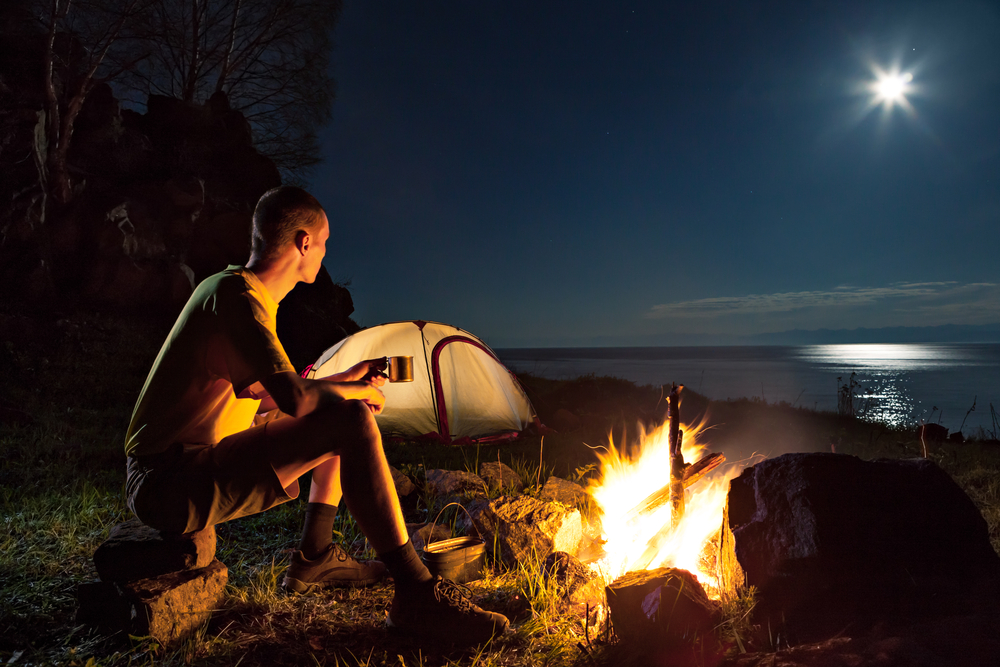Here's How Camping Helps You Fall Asleep

For people who have trouble falling asleep, a weekend camping trip could help, a new study finds.
After spending a few nights away from modern electric lights, the people in the study fell asleep earlier than normal, according to the study, which was published today (Feb. 2) in the journal Current Biology.
A person's biological clock is set in part by exposure to light, the researchers wrote in the study. But our modern living environments can throw our biological clocks out of whack, because we can expose ourselves to light that is outside of the natural sunrise-to-sunset cycle. [5 Surprising Sleep Discoveries]
The findings show "that a weekend camping trip can reset our [biological] clock rapidly," senior study author Kenneth Wright, an assistant professor in the department of kinesiology and applied physiology at the University of Colorado Boulder, said in a statement. In other words, getting away from the modern lighting environment can help to sync up a person's biological clock with the natural rhythms of day and night.
The researchers did two experiments in the study: one in the winter and one in the summer.
In the first experiment, the researchers sent five people out camping in the month of December in Colorado. Before the participants embarked on their camping trip, the researchers measured their melatonin levels over a 24-hour period, after they spent six days of keeping their usual sleep schedule. Levels of melatonin, which is sometimes called the sleep hormone, rise and fall throughout the day, and those levels can change in response to light.
After six days of camping — during which the participants didn't use flashlights or electronic devices — the people returned and had their melatonin levels measured again.
Sign up for the Live Science daily newsletter now
Get the world’s most fascinating discoveries delivered straight to your inbox.
While camping, the people were exposed to light that was 13 times brighter than the light they were exposed to when they were at home, the researchers found.
After their camping trip, the campers' melatonin levels started rising 2.6 hours earlier, compared to when they were at home, according to the study. In addition, when they were camping, the people went to sleep 2.5 hours earlier than when they were in a modern environment, and they slept about 2.3 hours longer, the researchers found.
But the differences in sun exposure are quite large between winter and summer, so the researchers wanted to see if summer camping could also shift the biological clock.
The second study included 14 people, nine of whom spent a weekend camping in Colorado in July. Unlike the winter study, while they were camping, the people were allowed to use flashlights and headlamps, but no other electronic devices. The researchers measured everyone's melatonin levels for 24 hours after the participants spent two days following their usual sleep habits, and then, after the participants spent the weekend either camping or at home, the researchers measured the study subjects' melatonin levels again. [Best Camping Spots in America's Backyard]
While the campers were exposed to more light during the day than were the people who stayed home, the difference was not as great as the one that was observed in the winter. The summer campers were exposed to four times more light during the day, compared to the 13-fold increase in light exposure that the winter campers experienced. This may be because people are already exposed to more light in the summer — since they spend more time outdoors — than in the winter, the researchers wrote.
The researchers found that the summer camping group went to bed at about the same time when they were camping on the weekend as when they were at home. But the summer group that didn't go camping went to bed almost 2 hours later on the weekend than they did during the week. People's sleep cycles are often disrupted on the weekend, when they go to bed later than usual and also sleep in, the researchers wrote. But spending the weekend camping prevented this typical disruption, they found.
In addition, the campers' melatonin levels started rising about an hour and a half earlier after their weekend camping trip, the researchers found. The melatonin levels of the stay-at-home group, however, started rising about an hour later on the weekend compared to when they rose during the week, they found.
If a person wanted to go to bed earlier, a weekend spent camping could be the answer, Wright said. Of course, if camping isn't an option, a person could focus on keeping a regular sleep schedule (meaning going to bed and waking up at the same time every day), increasing the amount of sunlight he or she is exposed to during the day and reducing his or her exposure to electrical light at night, he added.
In addition, the findings "highlight an opportunity for architectural design to bring in more natural sunlight into the modern-built environment," Wright said.
The researchers noted that more studies are needed that include more people. In addition, the researchers would like to determine how long it takes for the effects of natural lighting to reset the sleep cycle, they wrote.
Originally published on Live Science.











